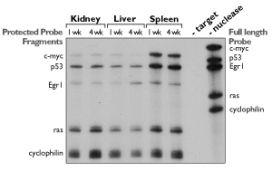Search
NEW! Poly(A) Tailing Kit
- Adds a poly(A) tail of at least 150 nucleotides to the 3' termini of RNA
- Enhances translational efficiency in vivo
- Adjustable reaction to control for tail length
- Optimized for use with RNA synthesized using the mMESSAGE mMACHINE Kit
The Poly(A) Tailing Kit uses E. coli Poly(A) Polymerase I (E-PAP) to polyadenylate the 3' termini of in vitro transcribed RNA. Polyadenylation plays an important role in the stabilization of RNA in eukaryotes and enhances the efficiency of translation initiation.
Enhance Translation Up to 10X
E-PAP is a 53 kD terminal adenylyltransferase with high specificity for ATP and RNA substrates. E-PAP's normal function is to polyadenylate mRNAs that then become targets for degradation by intracellular exonucleases. However, reports have shown that poly(A) tailing of in vitro transcripts increase mRNA stability when injected into Xenopus oocytes (1). In the Poly(A) Tailing Kit, Ambion has optimized the E-PAP reaction so that mRNAs are efficiently tailed with at least 150 adenines. Figure 1 shows various sized transcripts before and after a Poly(A) Tailing Kit reaction. The increased transcript size in the "after" lanes is a result of polyadenylation. The additional adenine residues confer stability to the mRNA resulting in increased translational efficiency of in vitro synthesized capped RNA in microinjection and transfection experiments (2,3,4).

Figure 1. Tailing of Variably Sized Transcripts. Transcripts of 0.5 kb, 1.5 kb and 4 kb were generated from mMESSAGE mMACHINE reactions and 10 µg of each were tailed with 2 units of E-PAP for 1 hour at 37°C. 0.5 µl of each reaction, pre-and post-tailing, were run on a 1% denaturing formaldehyde-agarose gel in 1X MOPS buffer, as per the protocol. Lanes were visualized by the addition of 50 µg/ml ethidium bromide into the gel loading buffer and viewed on a UV light box.
Transcripts with poly(A) tails show increased protein synthesis by 5-10 fold compared to un-tailed messages when transiently transfected into eukaryotic cells. HeLa cells were transfected with 1 µg of capped only or capped and polyadenylated luciferase transcripts at various time points. The capped and tailed transcript expressed 5.2-fold more protein over the capped only transcript as determined by luciferase assay (Figure 2).

Figure 2. Effect of Poly(A) Tail on Translation. Half of a luciferase transcript preparation synthesized with the mMESSAGE mMACHINE Kit was polyadenylated using the Poly(A) Tailing Kit. A microgram of either polyadenylated and unpolyadenylated transcript was transfected into HeLa cells. Luciferase protein was measured in the cells over various time points post transfection.
Quick, Controlled Polyadenylation of in Vitro Transcripts
When shorter poly(A) tails are required, the amount of E-PAP enzyme can be reduced to produce a corresponding decrease in tail length. In Figure 3, approximately 10 µg of a 188 base human ß-actin transcript was tailed at 37°C for 1 hour with varying amounts of E-PAP. The products were run on a 2.5% denaturing agarose gel and stained with ethidium bromide.

Figure 3. Titration of E-PAP into a Tailing Reaction. Human ß-actin 188 base control transcript (10 µg/rxn) from a mMESSAGE mMACHINE reaction was tailed with decreasing amounts of E-PAP for 1 hour at 37°C. 0.5 µl of each reaction was run on a 2.5% denaturing formaldehyde-agarose gel in 1X MOPS buffer, as per the protocol. Lanes were visualized by the addition of 50 µg/ml ethidium bromide into the gel loading buffer and viewed on a UV light box.
The Poly(A) Tailing reaction is simple and does not require the transcript to be purified. After in vitro transcription using the mMESSAGE mMACHINE Kit, the E-PAP enzyme and optimized buffer are added directly to the transcription reaction and a second incubation is performed at 37°C for 1 hour. The transcript is now capped, tailed, and ready for use.
The Poly(A) Tailing Kit contains E-PAP enzyme, buffer, ATP and the other necessary reagents. The Poly(A) Tailing Kit is optimized for use with Ambion's mMESSAGE mMACHINE High Yield Capped RNA Transcription Kit.
References
- Belasco, J, Brawerman, G (1993) Control of messenger RNA stability. Academic Press, San Diego, CA.
- Drummond DR, Armstrong J, Colman A (1985) Stability and movement of mRNAs and their encoded proteins in Xenopus oocytes. J Cell Biol 100(4): 1148-1156.
- Galili G, Kawata EE, Smith LD, Larkins BA (1988) Role of the 3'-poly(A) sequence in translational regulation of mRNAs in Xenopus laevis oocytes. J Biol Chem. 263(12): 5764-70.
- Wakiyama M, Futami T, Miura K (1997) Poly(A) dependent translation in rabbit reticulocyte lysate. Biochemie 79(12): 781-785.